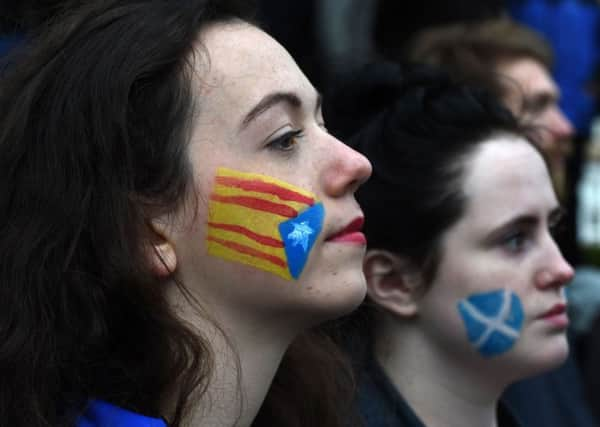Catalan blame falls mainly in Spain


She can console herself with this thought: for once, at least, it isn’t indyref2 that she has to worry about.
The disputed vote in Catalonia two weeks ago has lobbed a firecracker into the gathering of Nationalists by the Clyde.
Advertisement
Hide AdAdvertisement
Hide AdFor SNP members who are denied, at least for now, the elixir of their own constitutional battle, the allure of someone else’s is irresistible. At the SNP conference yesterday, a motion of fraternal solidarity got one of the biggest cheers of the session.
While trying to play down the risk of another referendum in Scotland, the First Minister has had to field awkward questions about a constitutional wrangle on the other side of Europe.
The foreign policies of both Scotland and Catalonia are carried out on the level of parliamentary canapé receptions, but Sturgeon was even asked at the weekend whether her government would “recognise” the breakaway Spanish region.
The interest is completely understandable. Anyone who saw footage of Guardia Civil officers raining down blows on Catalan citizens peacefully exercising their right to political self-expression could not help but be appalled.
Reports suggest that the regional government in Barcelona has backed away from plans to make a unilateral declaration of independence when the Catalan parliament meets today. Whatever statement it makes, however, with the Spanish and Catalan governments as far apart as ever, this is a crisis that is still deepening.
It is a situation crying out for cool heads and calm dialogue, but it is forever being loaded with unwanted significance by outside actors.
Scotland’s recent experience means that both sides in the constitutional debate close to home have at times been guilty of projecting their own indyref biases on to events in Spain. Now the same appears to be happening with Europe.
Nationalists in Scotland share the feeling of their Catalan counterparts that the European Union should have issued a stronger condemnation of the unjustifiable violence. During debate, yesterday, senior SNP figures with unquestionable pro-Europe credentials voiced that disappointment.
Advertisement
Hide AdAdvertisement
Hide AdThe debate also heard the accusation from MSP Sandra White that Brussels would be “complicit” in the cracking of heads if it didn’t speak out.
She might not wish it, but with that claim White is making some unlikely allies. Some of the staunchest Brexiteers have tried to co-opt the chaos in Catalonia to justify their belief that the EU is anti-democratic and quasi-authoritarian. Catalonia’s cause has been taken up by the continuity Leave campaign and its social media feed, which posted footage of Spanish police attacking voters under the heading “democracy, EU-style”. The Conservative MEP Daniel Hannan has claimed that the EU’s silence is evidence of its belief that “self-determination is both irrational and dangerous”.
And Nigel Farage himself said in the European Parliament that it was “quite extraordinary to realize that this Union is prepared to turn a blind eye” to the brutality meted out by the Guardia Civil.
There is a profound irony in Brexiteers trying to claim that police batons in Catalonia are somehow being wielded by the EU. In demanding action from Brussels, they are calling for the kind of interference in Spanish domestic affairs of Spain that they would never tolerate in the UK. And in blaming the denial of political self-determination for Catalans under the Spanish constitution on the EU, they are arguing for Brussels to have the kind of constitutional authority that European voters rejected more than a decade ago.
The motion passed by the SNP conference yesterday calls on the EU to offer its services as impartial mediators in the dispute. But the EU isn’t impartial in a dispute where one of the parties is a members and the other isn’t.
Brussels has to stand apart from internal political debates or open itself to similar demands for mediation, from Flanders to Corsica. That was the position it took towards Scotland in 2014, though Nationalists might not like to hear it. José Manuel Barroso’s doctrine was a simple repetition of fact: that Scotland would have to join the bloc as a new member state, however long that might take.
Had he done differently, he would have been taken to pieces by many of the same Brexiteers who loudly called for Scotland to remain in the UK, but now make odd champions for national self-determination elsewhere.
Even if it could play a role, the EU wouldn’t. A decade of financial crisis and the euroscepticism that fuelled Brexit has made it wary of such interventions. When a far-right party led by Jörg Haider entered government in Austria 17 years ago, the EU imposed diplomatic sanctions on one of its own members for the first time in its history. The measures were largely symbolic, and the division they sowed between EU members states had a far greater impact.
Advertisement
Hide AdAdvertisement
Hide AdElections in Austria look likely to produce another coalition that includes the far-right. It is hard to imagine the EU will consider even the limited steps it took before. In Poland, where a crisis is brewing over an erosion of judicial independence, Brussels has yet to press the “nuclear button” of suspending its voting rights.
The impasse in Catalonia represents a failure of democratic values that may yet end up in front of European courts. The blame rests wholly within the borders of Spain and largely at the door of the government in Madrid.
Politicians of every persuasion would do well to remember that before co-opting someone else’s injustice. That is a trap that the SNP, as it fights to convince Scots and its own supporters that their future lies in the EU, would do particularly well to avoid.